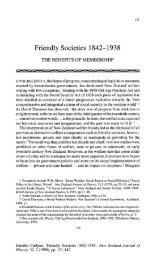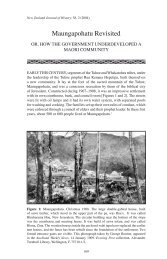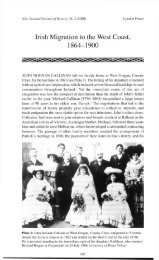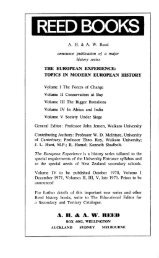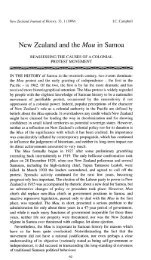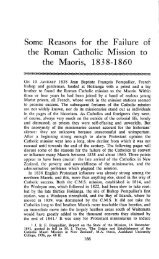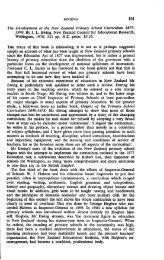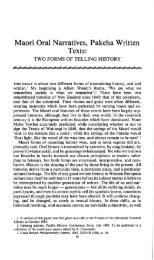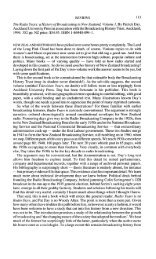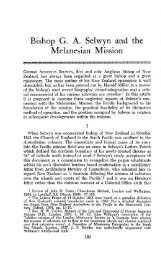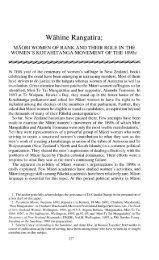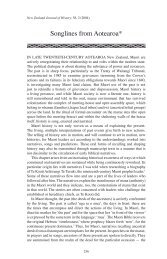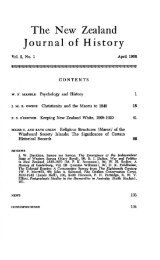John White - New Zealand Journal of History
John White - New Zealand Journal of History
John White - New Zealand Journal of History
You also want an ePaper? Increase the reach of your titles
YUMPU automatically turns print PDFs into web optimized ePapers that Google loves.
46 MICHAEL RE ILLY<br />
The story <strong>of</strong> <strong>White</strong>'s relationships with his informants is drawn either from<br />
Maori manuscript letters written to or from <strong>White</strong>, or from a journal kept by<br />
<strong>White</strong> as a young man in the Hokianga. This early journal chronicled his day-today<br />
dealings with Maori in the locality. Many <strong>of</strong> them are unidentified by name<br />
and they simply appear and disappear from the diary.<br />
One Maori who was clearly identified in the journal was Te Aho <strong>of</strong> the<br />
Mahurehure hapu at Waima. He seems to have been aged around ten or 12 in<br />
1846 or 1847; he is described as the son <strong>of</strong> a tohunga and a relation <strong>of</strong> Hone Heke.<br />
<strong>White</strong> considered him 'the only good friend I have'. The close and easy nature<br />
<strong>of</strong> their relationship is suggested by the way Te Aho was able to correct <strong>White</strong>'s<br />
use <strong>of</strong> Maori 'without any resirve', and 'in very strong language'. <strong>White</strong> added,<br />
'as he is good tempered and rather witty I put up with him'. 4 The two <strong>of</strong>ten<br />
worked together, Te Aho sometimes staying at <strong>White</strong>'s home. He was recorded<br />
as providing a range <strong>of</strong> material including traditional stories, recent historical<br />
incidents, and information on topics such as the signs <strong>of</strong> death. 5<br />
The most common technique <strong>White</strong> employed to obtain information from<br />
Maori was to tell them what he called 'tales'. These were used to encourage a<br />
response from a likely informant. The 'tales' were drawn from <strong>White</strong>'s reading<br />
<strong>of</strong> European literature, and could include synopses <strong>of</strong> Shakespearean plays,<br />
Josephus' account <strong>of</strong> the destruction <strong>of</strong> Jerusalem, or Sir Walter Scott's '7 dy<br />
<strong>of</strong> the Lake'. 6 Te Aho was not fooled about the reasons for <strong>White</strong> telling nim<br />
stories: 'told the Aho the tale <strong>of</strong> the Bear and the boy. he said I only told him it<br />
to get him to tell me more <strong>of</strong> his tales, "but" said he "you must not think but I know<br />
how you act you tell one to get 2. it may do with others but I am not to be done<br />
so," the little scamp, he has not guessed very far wrong' , 7 He was well aware that<br />
<strong>White</strong> also intended using such information for his own literary compositions.<br />
On one occasion he apparently told <strong>White</strong> he had a long tale to tell him but would<br />
not give it at that point, '"for", said he "I think you are writing tales <strong>of</strong> your own<br />
composition, besides writing all you hear from every person, and after awhile<br />
you will tell people the tales as true" he is a sharp little fellow'. 8<br />
One day Te AJio's father, identified only as a 'priest', became suspicious <strong>of</strong><br />
<strong>White</strong>'s reported knowledge and sought to interrogate him about it. Soon after<br />
Te Aho had told <strong>White</strong> a 'tale', the priest came into the house and in <strong>White</strong>'s<br />
words, 'began to question me as to the extent <strong>of</strong> my learning in bewitching'.<br />
<strong>White</strong> assured him he knew such things, 'also many <strong>of</strong> the English and <strong>of</strong> other<br />
nations'. Te Aho's father was not impressed by such reassurances. He wanted to<br />
know the name <strong>of</strong> the tohunga 'who divulged to me the most sacred <strong>of</strong> all<br />
knowledge'. <strong>White</strong> said he had sworn to keep it a secret and to only divulge it to<br />
'my own countrymen in print', to which Te Aho's father simply reiterated his<br />
belief that <strong>White</strong> knew nothing. Nevertheless, to ascertain whether this was so,<br />
4 <strong>John</strong> <strong>White</strong>, 'Private <strong>Journal</strong>' (PJ), 1846-50, 17 June 1847, Alexander Tumbull Library<br />
(ATL), Wellington.<br />
5 PJ, 15 May, 12, 26 December 1847.<br />
6 e.g. PJ, 10 February 1848, 27 October, 26 December 1846.<br />
7 PJ, 13 December 1847.<br />
8 PJ, 8 December 1847.



